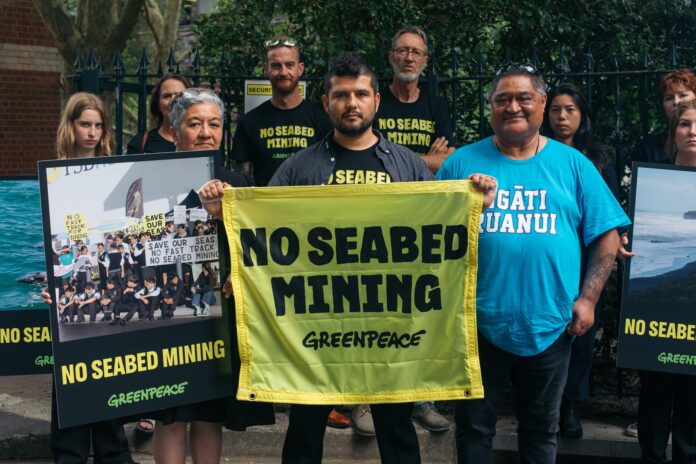SYDNEY, Thursday 28 November 2024 – Māori elders, alongside Greenpeace activists, have disrupted the annual general meeting of the Australian mining company Manuka Resources in Sydney, which is preparing to mine 50 million tonnes of iron sands for the next 35 years in the South Taranaki Bight, southwest of Auckland.
Flanked by Greenpeace activists from Aotearoa holding banners that read: “NO SEABED MINING,” elders Rukutai Watene and Peeti Wharehoka-Watene of Ngāti Ruanui entered the meeting alongside shareholders and took the floor to highlight the reasons that he and his hapū (subtribe) oppose seabed mining in their rohe (territory).
Australia’s Manuka Resources is the sole owner of Trans-Tasman Resources (TTR), which has for a decade tried and failed to get approval for a 35-year seabed mining project in the South Taranaki Bight, despite staunch opposition from the local iwi (tribe) and environmental groups. Under the Luxon Government, TTR has received approval to use the fast-track process to start mining. Experts say it could have a devastating impact on rare marine life, such as Hector’s and Māui dolphins, the pygmy blue whale, and kororā (little penguins).
In an emotional statement, Watene addressed shareholders and the Chair, saying that seabed mining has been resisted by mana whenua (traditional owners) for almost 20 years and said the iwi would continue to oppose TTR’s plans.
Rukutai Watene of Ngāti Ruanui says: “I am unapologetic about interrupting the Manuka Resources shareholders’ AGM. We’ve fought Trans-Tasman Resources three times in court and we’ve won three times, but now TTR is using the Fast Track and we have to fight them again. From the mountain to the sea, we will fight to protect our rohe and stop seabed mining taking place.”
Greenpeace Aotearoa spokesperson Juan Parada says: “We are taking this action today with representatives of Ngāti Ruanui to demonstrate that New Zealanders don’t want seabed mining. It shows Trans-Tasman Resources and Manuka Resources that we shall resist them wherever they are – even here in Australia.
“We’re highlighting the danger that Trans-Tasman Resources may get the chance to revive its zombie seabed mining project via the Fast Track despite years of community opposition and rejection by the courts.”
Parada says the project approval could significantly impact the Pacific and the rest of the world.
“This is a crucial moment in time because if TTR is allowed to operate the world’s first large-scale commercial seabed mine in Taranaki, it could open the floodgates to other wannabe seabed miners in Aotearoa, the Pacific and the rest of the world.
“If seabed mining in Taranaki is fast-tracked, it will be in contempt of all expert advice and the wishes of local iwi, environmental groups, Taranaki communities, and the 64,000 New Zealanders who have signed the petition calling for it to be banned.”
Last year, New South Wales banned offshore oil and gas exploration and seabed mining after the Northern Territory banned seabed mining in 2021.
— ENDS —






